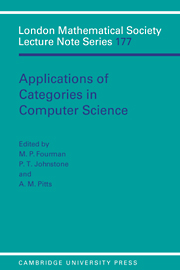 Applications of Categories in Computer Science
Applications of Categories in Computer Science Book contents
- Frontmatter
- Contents
- Preface
- Miscellaneous Frontmatter
- Computational comonads and intensional semantics
- Weakly distributive categories
- Sequentiality and full abstraction
- Remarks on algebraically compact categories
- Dinaturality for free
- Simply typed and untyped lambda calculus revisited
- Modelling reduction in confluent categories
- On clubs and data-type constructors
- Penrose diagrams and 2-dimensional rewriting
- Strong monads, algebras and fixed points
- Semantics of local variables
- Using fibrations to understand subtypes
- Reasoning about sequential functions via logical relations
- I-categories and duality
- Geometric theories and databases
- Partial products, bagdomains and hyperlocal toposes
Dinaturality for free
Published online by Cambridge University Press: 24 September 2009
- Frontmatter
- Contents
- Preface
- Miscellaneous Frontmatter
- Computational comonads and intensional semantics
- Weakly distributive categories
- Sequentiality and full abstraction
- Remarks on algebraically compact categories
- Dinaturality for free
- Simply typed and untyped lambda calculus revisited
- Modelling reduction in confluent categories
- On clubs and data-type constructors
- Penrose diagrams and 2-dimensional rewriting
- Strong monads, algebras and fixed points
- Semantics of local variables
- Using fibrations to understand subtypes
- Reasoning about sequential functions via logical relations
- I-categories and duality
- Geometric theories and databases
- Partial products, bagdomains and hyperlocal toposes
Summary
The first aim of this paper is to attack a problem posed in [1] about uniform families of maps between realizable functors on PER's.
To put this into context, suppose that we are given a category C to serve as our category of types. The authors of [1] observe that the types representable in the second-order lambda; calculus and most extensions thereof can be regarded as being obtained from functors (Cop × C)n → C by diagonalisation of corresponding contra and covariant arguments. Terms in the calculus give rise to dinatural transformations. This suggests a general structure in which parametrised types are interpreted by arbitrary functors (Cop × C)n → C, and their elements by dinatural transformations. Unfortunately as the authors of the original paper point out, this interpretation can not be carried out in general since dinaturals do not necessarily compose.
However, suppose we are in the extraordinary position that all families of maps which are of the correct form to be a dinatural transformation between functors (Cop × C)n → C are in fact dinatural, a situation in which we have, so to speak, the dinaturality for free. In this situation dinaturals compose. The result is a structure for a system in which types can be parametrised by types (second-order lambda calculus without the polymorphic types). Suppose, in addition, the category in question is complete, then we can perform the necessary quantification (which is in fact a simple product), and obtain a model for the second-order lambda calculus.
- Type
- Chapter
- Information
- Applications of Categories in Computer ScienceProceedings of the London Mathematical Society Symposium, Durham 1991, pp. 107 - 118Publisher: Cambridge University PressPrint publication year: 1992
- 2
- Cited by


